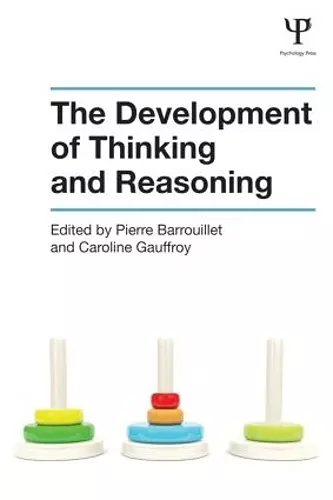The Development of Thinking and Reasoning
Pierre Barrouillet editor Caroline Gauffroy editor
Format:Paperback
Publisher:Taylor & Francis Ltd
Published:28th Feb '13
Currently unavailable, and unfortunately no date known when it will be back
This paperback is available in another edition too:
- Hardback£180.00(9781848721012)

Thinking and reasoning are key activities for human beings. In this book a distinguished set of contributors provides a wide readership with up-to-date scientific advances in the developmental psychology of thinking and reasoning, both at the theoretical and empirical levels.
The first part of the book illustrates how modern approaches to the study of thinking and reasoning have gone beyond the Piagetian legacy: through the investigation of avenues previously not explored, and by demonstrating that young children have higher capacities than was assumed within the Piagetian tradition. The second part focuses upon theoretical and empirical investigations of the interplay between logic and intuition in reasoning and decision making, and how these forms of thinking evolve with age, through the general framework of what is known as dual-process theories. Contrary to Piaget’s claim, it becomes apparent that elaborate adult reasoning could rely on some form of intuition.
The Development of Thinking and Reasoning provides psychologists, educators and everyone interested in child development with an integrated and up-to-date series of chapters, written by prominent specialists in the areas of thinking, reasoning, and decision making.
How do human thinkers interact with reasoning norms? The Development of Thinking and Reasoning is a timely and impressive answer based on post-Piagetian and dual-process theories. Its central themes include children’s surprising capabilities, adults’ unexpected liabilities to error, interplays between heuristic and rule-based inferences. The promise is inviting: understanding rationality requires a developmental focus.- Leslie Smith, Lancaster University, UK
Developmental science owes much to Piaget, but the domain has also evolved considerably since his time. The Development of Thinking and Reasoning provides a scholarly contemporary survey of one major branch of developmental research. Beyond introducing readers to current thinking in the field, however, this book serves another important purpose – drawing out connections across epochs and between schools of thought while also sharpening the differences between them. Students and scholars alike will find it a valuable contribution to the developmental literature.- Michael W. Connell, Institute for Knowledge Design, Massachusetts, USA
This work does an excellent job of reinforcing the aphorism attributed to Einstein that understanding physics is child's play compared to understand child's play. Summing Up: Recommended.- B.C. Beins, Ithaca College, for CHOICE, November 2013.
How do human thinkers interact with reasoning norms? The Development of Thinking and Reasoning is a timely and impressive answer based on post-Piagetian and dual-process theories. Its central themes include children’s surprising capabilities, adults’ unexpected liabilities to error, interplays between heuristic and rule-based inferences. The promise is inviting: understanding rationality requires a developmental focus.- Leslie Smith, Lancaster University, UK
Developmental science owes much to Piaget, but the domain has also evolved considerably since his time. The Development of Thinking and Reasoning provides a scholarly contemporary survey of one major branch of developmental research. Beyond introducing readers to current thinking in the field, however, this book serves another important purpose – drawing out connections across epochs and between schools of thought while also sharpening the differences between them. Students and scholars alike will find it a valuable contribution to the developmental literature.- Michael W. Connell, Institute for Knowledge Design, Massachusetts, USA
ISBN: 9781848721326
Dimensions: unknown
Weight: 408g
264 pages